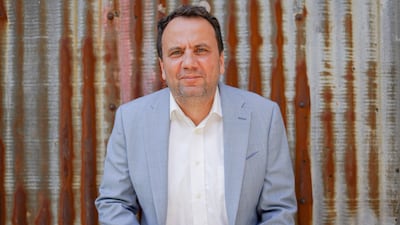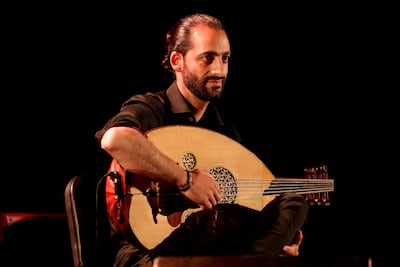After a decade of bringing Middle Eastern musicians to London’s stages, producer Khaled Ziada is looking forward to unveiling one of his other skills: cooking.
Next Sunday in the City of London, Ziada has organised an evening of storytelling with the London-based Palestinian playwright Elias Matar. Ziada will also cook Palestinian dishes for the audience to tuck into between stories. "It's my other passion," he told The National.
The event is one of a series celebrating Arabic culture, marking 10 years since Ziada set up Marsm, a music production company bringing pop, rock and classical music from the Middle East to the UK and Europe.
"People say we bring Arabic music to the UK" he said. "But I say we present music from the Arab world: we bring indie, rock, hip-hop, classical and soufi musicians.
It was Ziada who brought Lebanese singer-songwriter Marcel Khalife and rock band Mashrou3 Leila to major venues such as London’s Barbican and the Jazz Cafe.
"When we started we were a very small team," he said. "We believed at the time that Arabic culture needed a bigger presence in London. It's been a beautiful connection between us, the band and young audiences."
He was most recently involved as a co-organiser of Together for Palestine – the largest musical fund-raiser for Palestine in the UK to date, which raised more than £1.5 million in tickets sales, merchandising and donations in one night alone.
In the coming months he will organise the European tour for Palestinian composer and pianist Faraj Suleiman, among others.
Most of this season's events will focus on community, with dabke workshops and poetry evenings, culminating in a performance by Le Trio Joubran at the Barbican in November.
"It's the first time we've been invited to create an Arabic culture programme with the City of London," Ziada said. "We don't want it presented only to Arabic-speaking communities but to bring it to others, too."
Lebanese singer Sura launched the festival last week with an evening of traditional Lebanese, Syrian and Palestinian folk songs, including by icons such as Lebanese singers Fairouz and Najah Salam, Syrian tenor Sabah Fakhri.
Accompanying her was a 12-piece contemporary band arranged by the Egyptian producer and jazz guitarist Ziad Hashim. There were also soloists on Middle Eastern instruments, including Sura’s brother Nahi on the oud, as well as the sounds of the nay (a flute) and the violin.
Sura unveiled three of her own songs for the first time, drawn from themes in “our daily lives”. She said: “The idea for the songs just come to me when I’m doing something or thinking about something."
In Yasmeen Al Sham she sang: “My love the jasmine of Damascus, and all that is beautiful these days, I saw his eyes in that dream, before he saw mine.”
Co-written with Nahi, the siblings combine her love of catchy melodies with his classical training in Arabic music and maqam. “He’s classical trained in the maqam and I’m the crazy one,” she said.
Sura moved to the UK during Lebanon’s financial crisis in 2020 – leaving her home like many of her friends and contemporaries. She trained as an opera singer at the Lebanese Conservatory, but she had not sung for five years until she met Ziada, who convinced her to take part in a show last year.
Through Marsm, she quickly became immersed in the city's musical community, allowing her to develop her concert this week.
Ziada has been inspired by music from streets of Cairo, Tunis and Damascus. “The only thing I could do in London was to bring these beautiful sounds to the diaspora here,” he said.
Since then, he has seen the audience for his events grow from beyond the diaspora.
But the rising cost of travel, including visas to the UK, is one of their main obstacles. Ziada estimates that costs have gone up by 30 per cent since the pandemic. “We have to put the prices of our tickets up and the audiences notice that,” he said.
Their next challenge is to grow the audience of contemporary music from the Arab world in other major cities in the UK. "It's difficult because the community is much smaller," he said. "You have to find new challenges in your work."
Mercer, the investment consulting arm of US services company Marsh & McLennan, expects its wealth division to at least double its assets under management (AUM) in the Middle East as wealth in the region continues to grow despite economic headwinds, a company official said.
Mercer Wealth, which globally has $160 billion in AUM, plans to boost its AUM in the region to $2-$3bn in the next 2-3 years from the present $1bn, said Yasir AbuShaban, a Dubai-based principal with Mercer Wealth.
“Within the next two to three years, we are looking at reaching $2 to $3 billion as a conservative estimate and we do see an opportunity to do so,” said Mr AbuShaban.
Mercer does not directly make investments, but allocates clients’ money they have discretion to, to professional asset managers. They also provide advice to clients.
“We have buying power. We can negotiate on their (client’s) behalf with asset managers to provide them lower fees than they otherwise would have to get on their own,” he added.
Mercer Wealth’s clients include sovereign wealth funds, family offices, and insurance companies among others.
From its office in Dubai, Mercer also looks after Africa, India and Turkey, where they also see opportunity for growth.
Wealth creation in Middle East and Africa (MEA) grew 8.5 per cent to $8.1 trillion last year from $7.5tn in 2015, higher than last year’s global average of 6 per cent and the second-highest growth in a region after Asia-Pacific which grew 9.9 per cent, according to consultancy Boston Consulting Group (BCG). In the region, where wealth grew just 1.9 per cent in 2015 compared with 2014, a pickup in oil prices has helped in wealth generation.
BCG is forecasting MEA wealth will rise to $12tn by 2021, growing at an annual average of 8 per cent.
Drivers of wealth generation in the region will be split evenly between new wealth creation and growth of performance of existing assets, according to BCG.
Another general trend in the region is clients’ looking for a comprehensive approach to investing, according to Mr AbuShaban.
“Institutional investors or some of the families are seeing a slowdown in the available capital they have to invest and in that sense they are looking at optimizing the way they manage their portfolios and making sure they are not investing haphazardly and different parts of their investment are working together,” said Mr AbuShaban.
Some clients also have a higher appetite for risk, given the low interest-rate environment that does not provide enough yield for some institutional investors. These clients are keen to invest in illiquid assets, such as private equity and infrastructure.
“What we have seen is a desire for higher returns in what has been a low-return environment specifically in various fixed income or bonds,” he said.
“In this environment, we have seen a de facto increase in the risk that clients are taking in things like illiquid investments, private equity investments, infrastructure and private debt, those kind of investments were higher illiquidity results in incrementally higher returns.”
The Abu Dhabi Investment Authority, one of the largest sovereign wealth funds, said in its 2016 report that has gradually increased its exposure in direct private equity and private credit transactions, mainly in Asian markets and especially in China and India. The authority’s private equity department focused on structured equities owing to “their defensive characteristics.”
Our legal consultant
Name: Dr Hassan Mohsen Elhais
Position: legal consultant with Al Rowaad Advocates and Legal Consultants.
UAE currency: the story behind the money in your pockets
UAE currency: the story behind the money in your pockets
Brief scores:
Barcelona 3
Pique 38', Messi 51 (pen), Suarez 82'
Rayo Vallecano 1
De Tomas Gomez 24'
MO
%3Cp%3E%3Cstrong%3ECreators%3A%20%3C%2Fstrong%3EMohammed%20Amer%2C%20Ramy%20Youssef%3C%2Fp%3E%0A%3Cp%3E%3Cstrong%3EStars%3A%20%3C%2Fstrong%3EMohammed%20Amer%2C%20Teresa%20Ruiz%2C%20Omar%20Elba%3C%2Fp%3E%0A%3Cp%3E%3Cstrong%3ERating%3A%3C%2Fstrong%3E%204%2F5%3C%2Fp%3E%0A
Jetour T1 specs
Engine: 2-litre turbocharged
Power: 254hp
Torque: 390Nm
Price: From Dh126,000
Available: Now




